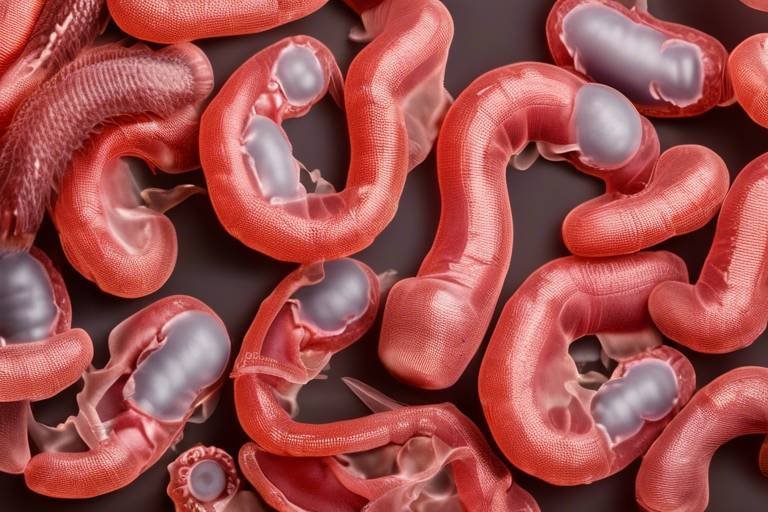Understanding the Connection Between Nutrition and Health
Have you ever wondered why some people seem to bounce back from illness while others struggle? The secret often lies in nutrition. Nutrition is not just about eating your fruits and vegetables; it's about understanding how what you consume affects your body and overall health. The food we eat serves as the foundation for our physical and mental well-being, shaping everything from our energy levels to our immune system. In fact, making informed dietary choices can lead to a healthier lifestyle, allowing you to thrive rather than just survive.
In today's fast-paced world, we often overlook the importance of balanced nutrition. Many of us resort to quick fixes, like fast food and sugary snacks, which can lead to a cascade of health issues. But what if I told you that by merely adjusting your diet, you could drastically improve your quality of life? Nutrition is like a fuel for your body; without the right kind, you wouldn't run efficiently. Think of your body as a high-performance car—would you fill it with low-grade fuel? Of course not! So why do we do the same with our bodies?
In this article, we'll delve into the intricate relationship between nutrition and health. We will explore macronutrients and micronutrients, the impact of processed foods, and even the fascinating role of the gut microbiome. By the end of our journey, you'll have a clearer understanding of how to make dietary choices that not only nourish your body but also enhance your overall well-being. So, buckle up and get ready to transform your approach to food!
Macronutrients, including carbohydrates, proteins, and fats, are the building blocks of our diet. They provide the energy we need to function daily and play critical roles in bodily functions. Carbohydrates are like the quick energy snacks you grab before a workout, while proteins are essential for muscle repair and growth—think of them as the bricks that build your body. Fats, often misunderstood, are vital for hormone production and nutrient absorption. Understanding the roles of these macronutrients can help you make informed dietary choices that promote optimal health.
While macronutrients are crucial, we must not overlook the importance of micronutrients. These include vitamins and minerals that play critical roles in various bodily processes. For instance, vitamin D is essential for bone health, while iron is vital for oxygen transport in the blood. A deficiency in these micronutrients can lead to serious health issues, making it essential to ensure adequate intake through a balanced diet. You might think that popping a multivitamin can solve the problem, but the truth is that whole foods offer a complex array of nutrients that supplements simply can't replicate.
Vitamins are like the unsung heroes of our diet. They support immune function, facilitate energy production, and help our bodies perform countless other tasks. There are two main categories of vitamins: water-soluble and fat-soluble. Each type has its unique functions and food sources, and understanding these can help you maintain a balanced diet.
Water-soluble vitamins, such as B-complex vitamins and vitamin C, are crucial for energy metabolism and immune support. They dissolve in water, which means they need to be replenished regularly through diet. Foods rich in these vitamins include citrus fruits, leafy greens, and whole grains. A deficiency in water-soluble vitamins can lead to fatigue, weakened immunity, and other health issues.
On the flip side, fat-soluble vitamins, including A, D, E, and K, are stored in the body's fatty tissues and liver. These vitamins play essential roles in various physiological functions, such as vision, bone health, and blood clotting. Sources of fat-soluble vitamins include dairy products, fatty fish, and nuts. However, it's crucial to consume them in moderation, as excessive intake can lead to toxicity.
Minerals are another critical component of nutrition. They are essential for bone health, fluid balance, and muscle function. Key minerals include calcium, potassium, and magnesium, each playing a unique role in maintaining bodily functions. A balanced diet rich in fruits, vegetables, whole grains, and lean proteins can help ensure you get the minerals your body needs to function optimally.
Processed foods are often laden with high levels of sugar, salt, and unhealthy fats. These ingredients can negatively affect your health, leading to obesity, diabetes, and heart disease. It's easy to fall into the trap of convenience, but the consequences can be severe. Many processed foods lack essential nutrients, leaving your body craving what it truly needs.
Reading food labels is crucial for making healthier choices. Understanding how to interpret labels can help you avoid unhealthy ingredients and make informed decisions. Look for products with shorter ingredient lists and those that prioritize whole foods. Remember, if you can't pronounce an ingredient, it might be best to steer clear!
Implementing strategies to reduce processed food intake can significantly enhance your overall health. Consider incorporating more whole foods into your diet, such as fruits, vegetables, and whole grains. Meal prepping can also help you avoid the temptation of grabbing unhealthy snacks on the go. Remember, small changes can lead to significant improvements in your health!
The gut microbiome plays a significant role in digestion and overall health. The trillions of bacteria residing in your gut are essential for breaking down food, absorbing nutrients, and even influencing your immune function. Nutrition directly influences the composition of your gut microbiome, making it vital to consume a diet that supports healthy gut bacteria.
Probiotics and prebiotics are essential for maintaining gut health. Probiotics are live bacteria found in fermented foods like yogurt and sauerkraut, while prebiotics are non-digestible fibers that feed these beneficial bacteria. Incorporating both into your diet can enhance gut function and improve overall health.
A healthy gut microbiome is essential for a robust immune system. Research shows that a balanced diet rich in fiber, fruits, and vegetables can help promote a diverse microbiome, which in turn supports immune function. Making mindful dietary choices is not just about looking good; it's about feeling good and staying healthy!
Chronic diseases, such as diabetes and heart disease, are often linked to poor nutrition. The good news? Dietary choices can prevent or manage these conditions effectively. By focusing on a balanced diet, you can reduce your risk and improve your quality of life.
Nutrition plays a vital role in maintaining heart health. Consuming a diet rich in fruits, vegetables, whole grains, and healthy fats can help reduce the risk of cardiovascular diseases. It's like giving your heart a workout with the right fuel—your body will thank you for it!
A balanced diet is crucial for managing diabetes. Nutritional strategies such as controlling carbohydrate intake and focusing on low-glycemic foods can help regulate blood sugar levels and improve overall health for individuals with diabetes. Think of it as steering your body toward a smoother ride, avoiding the bumps that come with poor dietary choices.
- What are macronutrients and why are they important? Macronutrients are the nutrients your body needs in large amounts, including carbohydrates, proteins, and fats. They provide energy and support bodily functions.
- How can I ensure I'm getting enough micronutrients? Eating a varied diet rich in fruits, vegetables, whole grains, and lean proteins can help you meet your micronutrient needs.
- What are some easy ways to reduce processed food intake? Meal prepping, choosing whole foods, and reading labels can help you avoid processed foods.
- Why is gut health important? A healthy gut microbiome is essential for digestion, nutrient absorption, and immune function.
- How can nutrition impact chronic diseases? Proper nutrition can help prevent and manage chronic diseases by reducing risk factors and promoting overall health.

The Role of Macronutrients
When we think about nutrition, it's essential to understand the role of macronutrients. These are the nutrients that our bodies require in larger amounts to function optimally. There are three primary macronutrients: carbohydrates, proteins, and fats. Each of these plays a unique and vital role in maintaining our health and well-being. Think of macronutrients as the building blocks of our diet, much like bricks are to a house. Without a solid foundation, the structure won't stand strong.
Carbohydrates are often misunderstood, but they are our body's main source of energy. When we consume carbs, our body breaks them down into glucose, which fuels our cells. It's like putting gas in a car; without it, the vehicle won't run. However, not all carbohydrates are created equal. Whole grains, fruits, and vegetables are excellent sources of complex carbohydrates, while sugary snacks and processed foods can lead to energy crashes and health issues.
Next up is protein, which is crucial for the growth and repair of tissues. Proteins are made up of amino acids, some of which our bodies can produce, while others must come from our diet. Imagine proteins as the repair crew for a building; they fix what’s broken and ensure everything is in top shape. Good sources of protein include lean meats, dairy products, legumes, and nuts. Including a variety of these foods in your diet helps ensure you get all the essential amino acids your body needs.
Finally, we have fats, which are often demonized in the world of nutrition, but they are indispensable for several bodily functions. Fats provide a concentrated source of energy, help absorb certain vitamins, and are vital for brain health. Think of fats as the insulation in your house; they keep everything running smoothly and protect the structure. Healthy fats can be found in avocados, olive oil, nuts, and fatty fish. It’s important to focus on unsaturated fats while limiting saturated and trans fats to maintain heart health.
In summary, each macronutrient serves a distinct purpose that contributes to our overall health. Balancing these nutrients in your diet is crucial for maintaining energy levels, supporting bodily functions, and promoting overall wellness. By understanding the roles of carbohydrates, proteins, and fats, you can make informed dietary choices that support a healthier lifestyle.
- What are macronutrients? - Macronutrients are nutrients required in large amounts that provide energy and support bodily functions. They include carbohydrates, proteins, and fats.
- Why are carbohydrates important? - Carbohydrates are the body's primary source of energy, essential for fueling daily activities and bodily functions.
- How much protein do I need? - The recommended dietary allowance for protein varies by age, sex, and activity level, but generally, adults should aim for 46-56 grams per day.
- Are all fats bad for you? - No, healthy fats are crucial for your body. Focus on unsaturated fats while limiting saturated and trans fats.

The Importance of Micronutrients
When we think about nutrition, our minds often jump to the big players: macronutrients like carbohydrates, proteins, and fats. But let’s not forget about the unsung heroes of our diet—micronutrients. These tiny but mighty components, which include vitamins and minerals, are essential for our bodies to function optimally. They may not provide energy in the same way that macronutrients do, but they are crucial for a myriad of bodily processes. Imagine trying to drive a car without oil; it might run for a while, but eventually, it will sputter and stop. Similarly, without adequate micronutrients, our bodies can’t perform at their best.
Micronutrients play a variety of roles in maintaining health. For instance, they help in the production of enzymes, hormones, and other substances that are necessary for proper growth and development. They also support our immune system, aid in wound healing, and help convert food into energy. The importance of these nutrients cannot be overstated, as deficiencies can lead to serious health issues. For example, a lack of vitamin D can result in weakened bones, while insufficient iron can cause anemia.
So, how do we ensure that we are getting enough of these vital nutrients? The answer lies in a balanced diet. Consuming a variety of foods from all food groups can help us meet our micronutrient needs. Fruits and vegetables are particularly rich in vitamins and minerals, and incorporating them into our meals can be both delicious and beneficial. Here’s a quick rundown of some key micronutrients and their sources:
| Micronutrient | Sources | Health Benefits |
|---|---|---|
| Vitamin A | Carrots, sweet potatoes, spinach | Supports vision and immune function |
| Vitamin C | Citrus fruits, strawberries, bell peppers | Boosts immune system and aids in collagen production |
| Iron | Red meat, beans, lentils | Essential for oxygen transport in the blood |
| Calcium | Dairy products, leafy greens, almonds | Important for bone health and muscle function |
Incorporating a range of colorful foods on your plate not only makes your meals more appealing but also ensures that you’re getting a broad spectrum of these essential nutrients. Think of your plate as a palette; the more colors you have, the more nutrients you’re likely to consume. However, in today’s fast-paced world, it can sometimes be challenging to get all the micronutrients we need from food alone. This is where supplements can play a role, but they should not replace a balanced diet.
In conclusion, micronutrients are a critical component of our overall health, and understanding their importance can help us make better dietary choices. By focusing on a varied diet rich in fruits, vegetables, whole grains, and lean proteins, we can ensure that our bodies receive the essential vitamins and minerals needed for optimal functioning. Remember, it’s not just about what you eat, but how well you nourish your body!
- What are micronutrients? Micronutrients are vitamins and minerals required in small amounts for various bodily functions.
- Why are micronutrients important? They support immune function, energy production, and overall health.
- How can I ensure I get enough micronutrients? By eating a balanced diet rich in fruits, vegetables, whole grains, and lean proteins.
- Can I rely on supplements for micronutrients? While supplements can help, they should not replace a balanced diet.
Vitamins and Their Functions
Vitamins are like the unsung heroes of our diet, playing crucial roles in keeping our bodies functioning optimally. They are organic compounds that our bodies need in small amounts to maintain various physiological processes. Each vitamin has its unique set of functions, and understanding these can help us make informed dietary choices that promote our overall health.
To break it down, vitamins can be categorized into two main groups: water-soluble and fat-soluble. Water-soluble vitamins, such as the B-complex vitamins and vitamin C, dissolve in water and are not stored in the body. This means we need to consume them regularly to avoid deficiencies. On the other hand, fat-soluble vitamins, including vitamins A, D, E, and K, are stored in the body’s fatty tissues and liver, allowing us to rely on them for longer periods.
Let’s take a closer look at some essential vitamins and their specific functions:
| Vitamin | Function | Food Sources |
|---|---|---|
| Vitamin A | Essential for vision, immune function, and skin health. | Carrots, sweet potatoes, spinach, and liver. |
| Vitamin C | Supports immune function, collagen synthesis, and acts as an antioxidant. | Citrus fruits, strawberries, bell peppers, and broccoli. |
| Vitamin D | Crucial for calcium absorption and bone health. | Fatty fish, fortified dairy products, and sunlight exposure. |
| Vitamin E | Acts as an antioxidant and supports immune function. | Nuts, seeds, and green leafy vegetables. |
| Vitamin K | Important for blood clotting and bone health. | Green leafy vegetables, broccoli, and Brussels sprouts. |
Each of these vitamins plays a vital role in our health, and a deficiency in any of them can lead to serious health issues. For instance, a lack of vitamin D can result in weakened bones, while insufficient vitamin C can lead to scurvy, characterized by fatigue and bleeding gums. Therefore, it’s essential to maintain a balanced diet rich in various vitamins to support our body’s needs.
Incorporating a variety of foods into our meals is the best way to ensure we’re getting enough vitamins. Think of your plate as a colorful palette; the more colors you add, the more nutrients you’ll likely be including. Whether it’s vibrant fruits, leafy greens, or hearty grains, each food contributes to your vitamin intake, enhancing your health and well-being.
So, next time you’re planning your meals, remember that vitamins are not just an afterthought—they are fundamental to your health. By making conscious dietary choices, you can ensure that your body has everything it needs to thrive.
- What are the best sources of vitamins? - A balanced diet that includes fruits, vegetables, whole grains, lean proteins, and healthy fats will provide a wide range of vitamins.
- Can I get enough vitamins from supplements? - While supplements can help, it’s best to get your vitamins from whole foods whenever possible, as they contain additional nutrients that supplements may lack.
- How do I know if I’m deficient in vitamins? - Symptoms of vitamin deficiency can vary, but common signs include fatigue, weakness, and changes in mood. A healthcare provider can perform blood tests to check your vitamin levels.
Water-Soluble Vitamins
Water-soluble vitamins are a fascinating and essential group of nutrients that play a crucial role in maintaining our overall health. Unlike their fat-soluble counterparts, these vitamins dissolve in water, which means they are not stored in the body for long periods. Instead, they need to be replenished regularly through our diet. The most notable water-soluble vitamins include the B-complex vitamins and vitamin C, each contributing uniquely to our bodily functions.
One of the primary functions of water-soluble vitamins is to assist in energy metabolism. For instance, B vitamins, such as B1 (thiamine), B2 (riboflavin), and B3 (niacin), are pivotal in converting carbohydrates, fats, and proteins into energy. Without adequate amounts of these vitamins, our bodies might struggle to perform even the simplest tasks, leaving us feeling fatigued and sluggish. Imagine trying to drive a car without fuel; that’s what it feels like when your body lacks these essential nutrients!
Vitamin C, on the other hand, is renowned for its role in supporting the immune system. It acts as a powerful antioxidant, protecting our cells from damage caused by free radicals. Additionally, vitamin C is vital for collagen production, which is crucial for skin health and wound healing. Think of it as the glue that holds your body together, ensuring everything functions seamlessly.
To ensure that we are getting enough water-soluble vitamins, it's essential to incorporate a variety of foods into our diet. Here’s a quick look at some common sources of these vitamins:
| Vitamin | Food Sources | Health Benefits |
|---|---|---|
| Vitamin B1 (Thiamine) | Whole grains, pork, legumes | Supports energy metabolism and nerve function |
| Vitamin B2 (Riboflavin) | Eggs, dairy products, green leafy vegetables | Essential for energy production and skin health |
| Vitamin B3 (Niacin) | Poultry, fish, whole grains | Helps convert food into energy and supports DNA repair |
| Vitamin C | Citrus fruits, strawberries, bell peppers | Boosts immunity and aids in collagen formation |
It's important to note that since water-soluble vitamins are excreted through urine, excessive intake is generally not a concern. However, deficiencies can lead to various health issues. For example, a lack of vitamin B12 can result in anemia and neurological issues, while insufficient vitamin C can lead to scurvy, characterized by fatigue, gum disease, and skin problems.
In conclusion, ensuring an adequate intake of water-soluble vitamins is vital for maintaining energy levels, supporting the immune system, and promoting overall health. By incorporating a colorful variety of fruits, vegetables, and whole grains into our meals, we can easily meet our nutritional needs and keep our bodies running like well-oiled machines.
- What are water-soluble vitamins? Water-soluble vitamins are vitamins that dissolve in water and are not stored in the body for long periods. They include the B-complex vitamins and vitamin C.
- Why do we need to consume water-soluble vitamins regularly? Since these vitamins are excreted through urine, they need to be replenished regularly through our diet to maintain optimal health.
- What happens if I don't get enough water-soluble vitamins? A deficiency in these vitamins can lead to various health problems, including fatigue, weakened immunity, and skin issues.
Fat-Soluble Vitamins
Fat-soluble vitamins are a group of essential nutrients that play a crucial role in maintaining various physiological functions in the body. These vitamins, which include Vitamin A, Vitamin D, Vitamin E, and Vitamin K, are stored in the body's fatty tissues and liver, allowing them to be utilized as needed. Unlike water-soluble vitamins, which are excreted through urine, fat-soluble vitamins can accumulate in the body, making it important to consume them in appropriate amounts.
Each of these vitamins has unique functions and health benefits:
- Vitamin A is vital for vision, immune function, and skin health. It helps maintain the integrity of epithelial tissues and is a powerful antioxidant.
- Vitamin D is essential for calcium absorption and bone health. It plays a significant role in immune function and has been linked to mood regulation.
- Vitamin E acts as an antioxidant, protecting cells from oxidative damage. It also supports immune function and skin health.
- Vitamin K is crucial for blood clotting and bone metabolism. It helps in the synthesis of proteins required for blood coagulation and bone formation.
The sources of fat-soluble vitamins are primarily found in dietary fats, which means that consuming them alongside healthy fats can enhance their absorption. For example, you can find these vitamins in:
| Vitamin | Food Sources |
|---|---|
| Vitamin A | Carrots, sweet potatoes, spinach, and liver. |
| Vitamin D | Fatty fish, fortified dairy products, and sunlight exposure. |
| Vitamin E | Nuts, seeds, vegetable oils, and green leafy vegetables. |
| Vitamin K | Green leafy vegetables, broccoli, and Brussels sprouts. |
However, it's important to be cautious about the intake of fat-soluble vitamins. Because they can accumulate in the body, excessive consumption may lead to toxicity. For instance, too much Vitamin A can cause liver damage and other serious health issues. Therefore, maintaining a balanced diet rich in a variety of foods is key to ensuring adequate, but not excessive, intake of these essential nutrients.
In summary, fat-soluble vitamins are vital for numerous bodily functions, and understanding their roles and sources can empower individuals to make informed dietary choices. By incorporating foods rich in these vitamins into your meals, you can support your overall health and well-being.
1. What are fat-soluble vitamins?
Fat-soluble vitamins are vitamins that dissolve in fats and oils, allowing them to be stored in the body's fatty tissues. They include Vitamins A, D, E, and K.
2. Why are fat-soluble vitamins important?
They play crucial roles in various bodily functions, including vision, bone health, immune function, and blood clotting.
3. Can I get too much of fat-soluble vitamins?
Yes, because they can accumulate in the body, excessive intake can lead to toxicity. It's important to consume them in moderation.
4. How can I ensure I'm getting enough fat-soluble vitamins?
Incorporate a variety of foods into your diet, such as leafy greens, fish, nuts, and healthy oils, to ensure adequate intake of these vitamins.
Minerals and Their Significance
Minerals are often the unsung heroes of our diet, yet their significance cannot be overstated. These inorganic elements play a crucial role in numerous bodily functions, from bone health to fluid balance and even muscle function. Without adequate minerals, our bodies can struggle to perform optimally, leading to a range of health issues. Think of minerals as the building blocks of our body's infrastructure; just as a house needs a solid foundation, our bodies require minerals to maintain strength and stability.
Among the essential minerals, some stand out for their particular importance. For instance, calcium is a key player in bone health, while potassium helps regulate blood pressure and fluid balance. Meanwhile, magnesium plays a role in over 300 biochemical reactions in the body, including energy production and muscle contractions. To give you a better idea of the various minerals and their functions, here's a quick overview:
| Mineral | Significance | Food Sources |
|---|---|---|
| Calcium | Bone health, muscle function | Dairy products, leafy greens |
| Potassium | Fluid balance, nerve signals | Bananas, potatoes, spinach |
| Magnesium | Energy production, muscle function | Nuts, seeds, whole grains |
| Iron | Oxygen transport in blood | Red meat, beans, lentils |
| Zinc | Immune function, wound healing | Meat, shellfish, legumes |
Incorporating a variety of these minerals into your diet is essential for maintaining overall health. Unfortunately, many people fall short of their daily mineral requirements, which can lead to deficiencies and health complications. For example, a lack of iron can result in anemia, characterized by fatigue and weakness, while insufficient calcium intake can lead to osteoporosis, a condition that weakens bones. Therefore, it’s vital to be proactive about your mineral intake.
To ensure you’re getting enough minerals, consider the following tips:
- Diversify your diet: Include a wide range of foods in your meals to cover various mineral needs.
- Pay attention to labels: Check the nutritional information on packaged foods to understand their mineral content.
- Consider supplements: If you struggle to meet your mineral requirements through food alone, talk to a healthcare provider about the possibility of taking supplements.
Remember, minerals are not just an afterthought; they are a critical component of a balanced diet. By prioritizing mineral-rich foods, you can enhance your overall health and well-being.
1. What are the most important minerals for health?
Calcium, potassium, magnesium, iron, and zinc are among the most important minerals that support various bodily functions.
2. How can I ensure I get enough minerals in my diet?
Incorporate a variety of fruits, vegetables, whole grains, nuts, seeds, and lean proteins into your meals to help meet your mineral needs.
3. Are mineral supplements necessary?
Supplements can be beneficial for individuals who have specific deficiencies or dietary restrictions, but it's best to consult with a healthcare provider before starting any supplementation.
4. What are the signs of mineral deficiency?
Symptoms can vary widely but may include fatigue, weakness, muscle cramps, and bone pain, depending on the specific mineral that is lacking.

The Impact of Processed Foods
Processed foods are everywhere, and let’s be honest: they’re super convenient. But have you ever stopped to think about what these foods are doing to your body? When we talk about processed foods, we're referring to anything that has been altered from its natural state, often to enhance flavor, shelf life, or convenience. While some processing is harmless, like freezing fruits and vegetables, many processed foods are packed with added sugars, sodium, and unhealthy fats. These ingredients can lead to a variety of health issues, including obesity, heart disease, and diabetes.
One of the most alarming aspects of processed foods is their high content of added sugars. It's not just about the sweetness; excessive sugar intake can lead to insulin resistance, which is a precursor to diabetes. Moreover, it contributes to weight gain and can even affect your mood and energy levels. Just think about it: when you indulge in a sugary snack, you might feel a quick energy boost, but it’s often followed by a crash that leaves you feeling tired and irritable.
Additionally, many processed foods are loaded with sodium. While sodium is essential for bodily functions, too much can lead to high blood pressure and increase the risk of heart disease. It's shocking to realize that a single serving of some processed snacks can contain more than half of the recommended daily sodium intake! So, when you're munching on those chips or that frozen dinner, you might be doing more harm than good.
Another major concern is the presence of unhealthy fats, particularly trans fats and saturated fats found in many processed foods. These fats can raise your bad cholesterol levels (LDL) while lowering your good cholesterol levels (HDL), leading to clogged arteries and heart issues. It's crucial to be aware of what you’re putting into your body because these unhealthy fats can sneak into your diet without you even realizing it.
To illustrate the impact of processed foods, consider the following table that compares the nutritional content of a typical processed snack versus a whole food alternative:
| Food Item | Calories | Sugar (g) | Sodium (mg) | Healthy Fats (g) |
|---|---|---|---|---|
| Processed Snack (e.g., potato chips) | 150 | 1 | 300 | 0.5 |
| Whole Food Alternative (e.g., mixed nuts) | 200 | 1 | 1 | 18 |
As you can see, while the calorie count might be similar, the nutritional value is vastly different. Whole foods not only provide essential nutrients but also healthy fats that are beneficial for your body. It’s essential to make informed choices when it comes to your diet. By reducing processed food intake and opting for whole foods, you can significantly improve your overall health and well-being.
So, how can you reduce your consumption of processed foods? Start by reading food labels carefully. Look for products with fewer ingredients and avoid those with long lists of unrecognizable additives. Another effective strategy is to plan your meals ahead of time. By preparing home-cooked meals, you can control what goes into your food and ensure you’re getting the nutrients your body needs. Remember, your health is a reflection of what you eat, and choosing whole foods over processed options can pave the way for a healthier lifestyle.
- What are processed foods?
Processed foods are items that have been altered from their natural state for safety reasons or convenience. This includes foods that are frozen, canned, or packaged.
- Are all processed foods bad for you?
No, not all processed foods are unhealthy. Some, like frozen fruits and vegetables, can be nutritious. It's the highly processed foods with added sugars, unhealthy fats, and sodium that pose health risks.
- How can I identify processed foods?
Check the ingredient list on the packaging. If it contains a long list of unrecognizable ingredients or additives, it's likely heavily processed.
- What are some healthy alternatives to processed snacks?
Opt for whole foods like fruits, nuts, yogurt, or homemade snacks that you prepare yourself.
Understanding Food Labels
When it comes to making healthier food choices, understanding food labels is absolutely essential. These labels are like a roadmap, guiding us through the complex world of nutrition. They provide vital information about what we are putting into our bodies, helping us to make informed decisions that align with our health goals. But let’s be honest: sometimes these labels can feel like they’re written in a foreign language! So, how do we decode them?
First off, the Nutrition Facts panel is where you should start. This panel lists essential information such as serving size, calories, and nutrients. It’s crucial to pay attention to the serving size because many people underestimate how much they actually consume. For instance, a snack bag might contain multiple servings, which can easily lead to consuming more calories than intended.
| Nutrient | Daily Value (%) | Importance |
|---|---|---|
| Calories | - | Measures energy content |
| Total Fat | 65g | Essential for energy, but too much can lead to health issues |
| Sodium | 2,300mg | High intake can increase blood pressure |
| Total Carbohydrates | 300g | Main source of energy |
| Protein | 50g | Essential for muscle repair and growth |
Next up, let’s talk about the ingredients list. This list is typically found below the Nutrition Facts panel and is arranged in descending order by weight. This means that the first few ingredients are the primary components of the food product. If you see sugar, high fructose corn syrup, or hydrogenated oils listed near the top, it’s a red flag! These ingredients can indicate that the product is highly processed and may not be the best choice for your health.
Moreover, watch out for added sugars. The American Heart Association recommends limiting added sugars to no more than 6% of total daily calories. This means that if you consume 2,000 calories a day, you should aim for no more than 120 calories from added sugars, which is about 30 grams. Many processed foods, from sauces to snacks, can contain surprising amounts of sugar. Always check the label!
Another key aspect to consider is allergens. Most food labels will highlight common allergens such as peanuts, tree nuts, dairy, soy, and gluten. If you have food allergies or sensitivities, this information is crucial for avoiding adverse reactions. Always look for allergen warnings, which are often placed in bold text.
Lastly, don’t forget to check for nutritional claims. Terms like “low-fat,” “sugar-free,” or “organic” can be misleading. Just because a product is labeled as “fat-free” doesn’t mean it’s healthy. It may still contain high levels of sugars or artificial ingredients. Always read beyond the claims and check the actual nutritional content.
In conclusion, understanding food labels empowers you to make better dietary choices. By familiarizing yourself with the Nutrition Facts panel, ingredients list, and allergen warnings, you can navigate the grocery store with confidence. Remember, knowledge is power, especially when it comes to your health!
- What should I look for first on a food label? Start with the Nutrition Facts panel, focusing on serving size and calories.
- Are all processed foods bad? Not necessarily! Some processed foods can be healthy, but it's essential to read the labels carefully.
- How can I tell if a product is truly healthy? Look for whole food ingredients, minimal added sugars, and avoid artificial additives.
Strategies for Reducing Processed Foods
Reducing processed foods from your diet can feel like a daunting task, but it’s essential for achieving a healthier lifestyle. The key is to start small and gradually make changes that will stick. One effective strategy is to focus on meal planning. By planning your meals for the week, you can ensure that you have all the ingredients you need to prepare wholesome, home-cooked meals. This not only saves time but also reduces the temptation to reach for quick, processed options when hunger strikes.
Another approach is to stock your pantry with healthy staples. Fill your kitchen with whole foods like grains, legumes, nuts, seeds, and plenty of fresh fruits and vegetables. When you have these foods readily available, you’re less likely to opt for processed snacks or meals. Additionally, consider making a shopping list before you go grocery shopping. This helps you stay focused on purchasing whole, unprocessed items and avoids impulse buys that can lead to bringing unhealthy options home.
Don't underestimate the power of cooking at home. When you prepare your meals, you have complete control over the ingredients, making it easier to avoid additives and preservatives commonly found in processed foods. Try to set aside some time each week to cook in batches. You can prepare larger quantities of nutritious meals that can be refrigerated or frozen for later use. This not only saves you time during busy weekdays but also ensures you have healthy options readily available.
When dining out, it’s essential to make informed choices. Look for restaurants that prioritize fresh, local ingredients and offer whole food options. Don't hesitate to ask the staff about how dishes are prepared and request modifications to make your meal healthier. For instance, you can ask for sauces and dressings on the side or substitute fried items with steamed vegetables. This way, you can enjoy eating out without compromising your health goals.
Lastly, consider incorporating mindful eating practices into your daily routine. Pay attention to what you eat and savor each bite. This can help you become more aware of your food choices and reduce the likelihood of reaching for processed snacks out of habit or boredom. By being present during meals, you can cultivate a deeper appreciation for whole foods and their benefits.
Q: What are processed foods?
A: Processed foods are foods that have been altered from their original form through methods such as freezing, canning, or adding preservatives. This includes items like sugary snacks, canned soups, and frozen dinners.
Q: Why should I reduce processed foods?
A: Reducing processed foods can lead to better overall health, as these foods often contain high levels of sugar, unhealthy fats, and sodium. A diet rich in whole foods can help prevent chronic diseases and promote better digestion and energy levels.
Q: How can I tell if a food is processed?
A: Generally, if a food has a long ingredient list with many unfamiliar additives, it’s likely processed. Look for items with few ingredients, ideally whole foods that you can recognize.
Q: Can I still enjoy snacks if I reduce processed foods?
A: Absolutely! You can opt for healthier snacks such as fresh fruits, nuts, yogurt, or homemade energy bars. The key is to choose snacks that are nutritious and satisfying.

The Gut Microbiome and Nutrition
The gut microbiome is like a bustling city within your digestive system, teeming with trillions of microorganisms that play a crucial role in your overall health. These tiny inhabitants, including bacteria, viruses, fungi, and other microbes, work together to maintain a delicate balance that influences everything from digestion to immune function. But did you know that your nutrition can significantly impact this vibrant community? Just as a city thrives on a variety of resources, your gut microbiome flourishes on a diverse range of nutrients. A balanced diet rich in fiber, fruits, vegetables, and whole grains can help cultivate a healthy microbiome, while a diet high in processed foods can disrupt this balance.
Research has shown that what you eat directly affects the composition of your gut microbiota. For instance, diets high in fiber promote the growth of beneficial bacteria, which in turn can enhance your digestion and boost your immune system. On the other hand, diets laden with sugar and unhealthy fats can lead to an overgrowth of harmful bacteria, potentially resulting in digestive issues and chronic diseases. It's a classic case of you are what you eat—nourishing your body with wholesome foods not only fuels your energy but also supports a thriving gut ecosystem.
Moreover, the relationship between the gut microbiome and nutrition is a two-way street. A healthy gut can improve nutrient absorption, allowing your body to utilize vitamins and minerals more effectively. This is particularly important for maintaining energy levels and overall well-being. To illustrate this connection, consider the following table that highlights some key foods and their impact on gut health:
| Food | Impact on Gut Health |
|---|---|
| Fruits and Vegetables | Rich in fiber and antioxidants, they promote the growth of beneficial bacteria. |
| Whole Grains | Provide prebiotics, which serve as food for healthy gut bacteria. |
| Fermented Foods | Introduce live probiotics that can enhance gut flora diversity. |
| Processed Foods | High in sugar and unhealthy fats, they can lead to dysbiosis (imbalance of gut bacteria). |
Incorporating a variety of these foods into your diet can be a game changer for your gut health. Think of it like planting a garden; the more diverse the plants, the more vibrant and resilient the garden becomes. However, it's not just about what you eat, but also how you eat. Mindful eating practices, such as chewing your food thoroughly and taking the time to enjoy your meals, can also positively influence your gut microbiome.
As we delve deeper into the connection between nutrition and the gut microbiome, it’s essential to recognize the role of probiotics and prebiotics. Probiotics are live bacteria found in fermented foods like yogurt, kefir, and sauerkraut, while prebiotics are types of fiber that nourish these beneficial bacteria. Including both in your diet can significantly enhance gut health, creating a harmonious environment that supports digestion and immunity.
Q: What are probiotics and prebiotics?
A: Probiotics are live beneficial bacteria found in fermented foods, while prebiotics are non-digestible fibers that feed these bacteria.
Q: How can I improve my gut health through diet?
A: Focus on consuming a diverse range of fiber-rich foods, fermented products, and minimizing processed food intake.
Q: Can poor gut health affect my overall health?
A: Yes, an imbalanced gut microbiome can lead to digestive issues, weakened immunity, and even chronic diseases.
Q: How long does it take to improve gut health?
A: It varies by individual, but making consistent changes to your diet can lead to improvements in gut health within a few weeks.
Probiotics and Prebiotics
When it comes to gut health, probiotics and prebiotics are the dynamic duo you need to know about. Think of probiotics as the friendly little soldiers that help keep your gut in check, while prebiotics serve as their food, nourishing these beneficial bacteria and helping them thrive. Together, they play a crucial role in maintaining a balanced gut microbiome, which is essential for overall health.
So, what exactly are probiotics? These are live microorganisms, often referred to as "good" bacteria, that can provide a range of health benefits when consumed in adequate amounts. They help with digestion, enhance immune function, and may even improve mental health. Common sources of probiotics include fermented foods such as yogurt, kefir, sauerkraut, and kimchi. Imagine these foods as a buffet for your gut, offering a feast of beneficial bacteria that can help fend off harmful pathogens.
On the flip side, we have prebiotics, which are non-digestible food components that promote the growth and activity of beneficial gut bacteria. They are typically found in high-fiber foods like bananas, onions, garlic, and whole grains. Think of prebiotics as the fertilizer for your gut garden, enriching the soil and providing the ideal environment for your probiotics to flourish.
To truly understand the significance of probiotics and prebiotics, let’s take a look at how they work together:
| Probiotics | Prebiotics |
|---|---|
| Live beneficial bacteria | Non-digestible fibers that feed probiotics |
| Found in fermented foods | Found in fruits, vegetables, and whole grains |
| Helps balance gut bacteria | Supports the growth of beneficial bacteria |
Incorporating both probiotics and prebiotics into your diet can lead to a healthier gut, which in turn can improve digestion, boost immunity, and even enhance mood. However, it’s essential to consume them in the right balance. A diet rich in prebiotics can help ensure that the probiotics you consume have enough food to thrive. It’s like having a well-stocked fridge for your gut bacteria!
But how do you know if you're getting enough of these gut heroes? Pay attention to your diet and consider adding a variety of fermented foods and high-fiber options to your meals. You might also want to consider a probiotic supplement, but it’s always best to consult with a healthcare professional before starting any new regimen.
In summary, probiotics and prebiotics are vital players in the game of gut health. By understanding their roles and incorporating them into your daily diet, you can pave the way for a healthier, happier you. Remember, a happy gut leads to a happy life!
- What are the best sources of probiotics? Yogurt, kefir, sauerkraut, kimchi, and miso are excellent sources of probiotics.
- Can I get enough prebiotics from my diet? Yes, foods like bananas, garlic, onions, and whole grains are rich in prebiotics.
- How do I know if I need probiotics? If you're experiencing digestive issues or have recently taken antibiotics, a probiotic may be beneficial.
- Is it safe to take probiotic supplements? While generally safe for most people, it’s best to consult with a healthcare provider before starting any supplements.
The Link Between Gut Health and Immunity
Did you know that your gut is often referred to as your "second brain"? This isn’t just a catchy phrase; it's a testament to the profound impact that gut health has on your overall well-being, particularly your immune system. The gut is home to trillions of microorganisms, collectively known as the gut microbiome. These tiny creatures play a crucial role in not only digesting food but also in modulating our immune response. When your gut is healthy, it can effectively fight off pathogens and keep your immune system functioning at its best.
A balanced gut microbiome is essential for maintaining a robust immune system. When the gut flora is out of balance—often due to poor diet, stress, or antibiotic use—it can lead to a condition known as dysbiosis. Dysbiosis can compromise your immune response, making you more susceptible to infections and diseases. It’s as if your gut is the gatekeeper of your health, and when it’s not functioning properly, the gates to illness swing wide open.
So, how does nutrition come into play in this intricate relationship? The foods you consume can either nourish or starve the beneficial bacteria in your gut. A diet rich in fiber, fermented foods, and prebiotics can promote the growth of good bacteria, enhancing your gut health and, in turn, your immunity. For instance, foods like yogurt, kefir, sauerkraut, and bananas are fantastic for feeding your gut flora. On the flip side, diets high in sugar and processed foods can lead to an overgrowth of harmful bacteria, which can trigger inflammation and weaken your immune defenses.
To illustrate the connection between gut health and immunity, consider the following table that outlines key foods and their effects on gut bacteria and immune function:
| Food Type | Effect on Gut Health | Impact on Immunity |
|---|---|---|
| Fermented Foods | Promotes growth of beneficial bacteria | Enhances immune response |
| High-Fiber Foods | Feeds gut bacteria, promoting diversity | Reduces inflammation, supports immunity |
| Processed Foods | Promotes harmful bacteria growth | Weakens immune response |
Moreover, research has shown that a healthy gut microbiome can influence the production of antibodies and the activation of T-cells, both of which are vital for a strong immune response. It’s fascinating to think that the food you eat today can impact your body’s ability to fight off illnesses tomorrow. So, the next time you sit down for a meal, remember that you’re not just feeding yourself; you’re also feeding the trillions of microorganisms that are working hard to keep you healthy.
In summary, maintaining a healthy gut is not just about avoiding digestive issues; it’s about fortifying your entire immune system. By making conscious dietary choices that promote gut health, you can significantly enhance your body’s ability to fend off infections and diseases. The link between gut health and immunity is undeniable, making nutrition a critical component of your overall health strategy.
- How can I improve my gut health? Focus on incorporating more fiber-rich foods, fermented products, and prebiotics into your diet.
- Can stress affect my gut health? Yes, stress can disrupt the balance of gut bacteria, leading to various health issues.
- Is it possible to have a healthy gut without probiotics? While probiotics can help, a balanced diet rich in whole foods can also support gut health effectively.

Nutrition and Chronic Diseases
Chronic diseases have become a significant concern in today's health landscape, with conditions like diabetes, heart disease, and obesity affecting millions of people worldwide. It's essential to recognize that nutrition plays a pivotal role in either exacerbating or alleviating these health issues. When we talk about chronic diseases, it’s like standing at a crossroads; the choices we make regarding our diet can lead us down different paths—one toward health and vitality, and the other toward illness and discomfort.
Research consistently shows that a balanced diet rich in whole foods can significantly reduce the risk of developing chronic diseases. For instance, diets that are high in fruits, vegetables, whole grains, and lean proteins provide the body with necessary nutrients and antioxidants that combat inflammation and oxidative stress—two key players in the development of chronic conditions. On the flip side, diets laden with processed foods, sugars, and unhealthy fats can pave the way for health issues.
Let’s break down how nutrition affects some of the most common chronic diseases:
| Disease | Impact of Nutrition | Dietary Recommendations |
|---|---|---|
| Heart Disease | High saturated fats and trans fats can lead to plaque buildup in arteries. | Increase intake of fruits, vegetables, and whole grains; limit salt and sugar. |
| Diabetes | Uncontrolled carbohydrate intake can lead to spikes in blood sugar levels. | Focus on complex carbohydrates, fiber-rich foods, and lean proteins. |
| Obesity | Excessive calorie intake from unhealthy food choices contributes to weight gain. | Adopt portion control, and incorporate more physical activity. |
For those already living with chronic diseases, nutrition becomes even more critical. Making informed dietary choices can help manage symptoms and improve overall quality of life. For example, individuals with diabetes need to monitor their carbohydrate intake closely. This doesn’t mean they can’t enjoy their meals; it’s about making smarter choices. Swapping out white bread for whole grain, or sugary drinks for water or herbal teas, can be game-changers.
Moreover, the connection between nutrition and chronic diseases extends beyond just what we eat. The timing of meals, portion sizes, and even the way we prepare food can influence our health outcomes. It’s like crafting a masterpiece; every ingredient matters, and the right combinations can create a healthy, vibrant life.
In conclusion, the relationship between nutrition and chronic diseases is profound and multifaceted. By understanding and implementing healthy dietary choices, we can take proactive steps towards preventing and managing these conditions. It’s not just about avoiding certain foods; it’s about embracing a lifestyle that prioritizes health and well-being.
- Can nutrition really prevent chronic diseases? Yes, a balanced diet rich in whole foods can significantly reduce the risk of chronic diseases.
- What are some quick dietary changes I can make? Start by incorporating more fruits and vegetables into your meals, and reduce processed food intake.
- How important is portion control? Portion control is crucial; it helps manage calorie intake and can prevent overeating.
- Is it too late to change my diet if I already have a chronic disease? It's never too late! Making healthier choices can improve your condition and overall health.
Heart Health and Nutrition
When it comes to maintaining a healthy heart, nutrition plays a pivotal role. It's not just about eating less fat or cutting out sugar; it's about understanding how different foods can either support or hinder your cardiovascular health. Think of your heart as a finely tuned engine; the right fuel can keep it running smoothly, while the wrong fuel can lead to serious problems. So, what should you be eating to keep your heart in tip-top shape?
First and foremost, incorporating heart-healthy foods into your diet is essential. Foods rich in omega-3 fatty acids, such as salmon, walnuts, and flaxseeds, are known to lower blood pressure and reduce inflammation. Additionally, fruits and vegetables pack a punch with their antioxidants, which help combat oxidative stress and inflammation in the body. Aim for a colorful plate; the more vibrant the colors, the more nutrients you’re likely getting!
Don't forget about whole grains! Whole grains like oats, quinoa, and brown rice are excellent sources of fiber, which can help lower cholesterol levels. Fiber acts like a broom, sweeping away excess cholesterol from your bloodstream. You might be surprised to learn that even a simple switch from white bread to whole grain can have a significant impact on your heart health.
Moreover, it's crucial to be mindful of processed foods. These often contain unhealthy trans fats, excessive sodium, and added sugars, all of which can contribute to heart disease. When shopping, take a moment to read the labels. If you see ingredients you can't pronounce, there's a good chance those foods are not doing your heart any favors.
To illustrate the impact of different foods, consider the following table:
| Food Type | Heart Health Benefits |
|---|---|
| Fatty Fish (Salmon, Mackerel) | Rich in omega-3 fatty acids, lowers blood pressure |
| Leafy Greens (Spinach, Kale) | High in vitamins and minerals, reduces inflammation |
| Berries (Blueberries, Strawberries) | Antioxidants that protect heart health |
| Nuts (Almonds, Walnuts) | Healthy fats that improve cholesterol levels |
| Whole Grains (Oats, Quinoa) | High in fiber, helps lower cholesterol |
Lastly, let’s talk about portion control. Even the healthiest foods can contribute to weight gain if consumed in excess. Maintaining a healthy weight is crucial for heart health, as being overweight can lead to increased blood pressure and cholesterol levels. Think of your plate as a canvas; balance is key to creating a masterpiece that supports your heart!
In summary, by making informed dietary choices and prioritizing whole, nutrient-dense foods, you can significantly enhance your heart health. Remember, it’s not just about what you eat, but how you eat it. Enjoy your meals, savor the flavors, and your heart will thank you!
- What foods should I avoid for heart health? It's best to limit processed foods, sugary snacks, and those high in trans fats and sodium.
- How much omega-3 should I include in my diet? Aim for at least two servings of fatty fish per week to meet your omega-3 needs.
- Can I eat carbs if I want to maintain heart health? Yes, but focus on whole grains and limit refined carbohydrates.
- Is it necessary to take supplements for heart health? It’s best to get nutrients from food, but consult with a healthcare provider for personalized advice.
Managing Diabetes Through Diet
When it comes to managing diabetes, diet plays a pivotal role in keeping blood sugar levels stable and maintaining overall health. It's not just about cutting out sugar; it's about making informed choices that nourish your body and help you feel your best. Think of your diet as a toolkit—each food item is a tool that can either help you build a strong foundation for your health or create obstacles that make it harder to manage your condition.
One of the most effective strategies for managing diabetes is to focus on a balanced diet that includes a variety of foods. This means incorporating whole grains, lean proteins, healthy fats, and plenty of fruits and vegetables into your meals. These foods not only provide essential nutrients but also help regulate blood sugar levels. For instance, whole grains like brown rice and quinoa have a lower glycemic index compared to refined grains, meaning they cause a slower rise in blood sugar.
In addition to choosing the right foods, portion control is crucial. Even healthy foods can lead to elevated blood sugar levels if consumed in large quantities. It's important to be mindful of serving sizes and to listen to your body’s hunger cues. A helpful approach is to use the plate method, where you fill half your plate with non-starchy vegetables, a quarter with lean protein, and the remaining quarter with whole grains or starchy vegetables. This visual guide can simplify meal planning and ensure you're getting a balanced intake.
Another key aspect of managing diabetes through diet is understanding the impact of carbohydrates. Carbs are essential for energy, but not all carbs are created equal. Complex carbohydrates, found in foods like legumes, whole grains, and vegetables, are digested more slowly, leading to steadier blood sugar levels. In contrast, simple carbohydrates, such as those found in sugary snacks and drinks, can cause rapid spikes and crashes in blood sugar. Therefore, it’s beneficial to prioritize complex carbs while being cautious with simple sugars.
To illustrate how different foods can affect blood sugar, consider the following
| Food Type | Glycemic Index (GI) | Effect on Blood Sugar |
|---|---|---|
| White Bread | 75 | High spike |
| Brown Rice | 55 | Moderate spike |
| Oatmeal | 50 | Low spike |
| Fruits (e.g., apples, berries) | 30-40 | Low spike |
Incorporating foods with a low glycemic index can help you maintain better control over your blood sugar. Additionally, don’t forget about the importance of fiber. Foods high in fiber, such as vegetables, fruits, nuts, and legumes, can slow down the absorption of sugar and improve overall blood sugar levels.
Finally, staying hydrated is often overlooked but is essential in managing diabetes. Water is the best choice, as sugary drinks can lead to unwanted spikes in blood sugar. Aim to drink plenty of fluids throughout the day, and consider herbal teas or flavored water as alternatives to sugary beverages.
In summary, managing diabetes through diet requires a multifaceted approach that includes making informed food choices, practicing portion control, and understanding the role of carbohydrates. By focusing on whole, nutrient-dense foods and being mindful of how different foods affect your blood sugar, you can take significant steps toward better health.
- Can I eat fruits if I have diabetes? Yes, fruits can be part of a healthy diet for diabetes, especially those with a low glycemic index like berries and apples.
- How often should I eat? It's often recommended to eat smaller, balanced meals throughout the day to help maintain stable blood sugar levels.
- Is it necessary to avoid all carbohydrates? No, it's important to include complex carbohydrates in your diet; just be mindful of portions and choose whole grains over refined grains.
Frequently Asked Questions
- What are macronutrients and why are they important?
Macronutrients are the nutrients our bodies need in large amounts to function properly. They include carbohydrates, proteins, and fats. Each plays a unique role: carbohydrates provide energy, proteins are essential for growth and repair, and fats support cell function and hormone production. Understanding these can help you make better dietary choices for optimal health.
- How can I ensure I'm getting enough micronutrients?
Micronutrients, which include vitamins and minerals, are crucial for various bodily functions. To ensure you're getting enough, focus on a balanced diet rich in fruits, vegetables, whole grains, lean proteins, and healthy fats. Consider consulting with a healthcare provider or nutritionist for personalized advice based on your dietary needs.
- What are the health risks associated with processed foods?
Processed foods are often high in sugar, salt, and unhealthy fats, which can lead to various health issues, including obesity, heart disease, and diabetes. Regular consumption can also contribute to poor nutritional habits. It's essential to read food labels and limit intake of these foods for better health.
- What should I look for on food labels?
When reading food labels, pay attention to the ingredient list, serving size, and nutritional information. Look for items with fewer ingredients, avoid added sugars, and check for unhealthy fats like trans fats. This knowledge empowers you to make healthier choices and avoid harmful ingredients.
- How does nutrition affect gut health?
Nutrition plays a significant role in maintaining a healthy gut microbiome, which is essential for digestion and overall health. A diet rich in fiber, probiotics, and prebiotics can promote the growth of beneficial bacteria, thereby enhancing gut function and supporting immune health.
- Can nutrition help manage chronic diseases?
Absolutely! Proper nutrition is crucial for managing chronic diseases such as diabetes and heart disease. A balanced diet can help regulate blood sugar levels, lower cholesterol, and reduce inflammation, which are all vital for preventing and managing these conditions.
- What dietary changes can improve heart health?
To promote heart health, focus on a diet low in saturated fats, trans fats, and cholesterol. Incorporating more fruits, vegetables, whole grains, and lean proteins can significantly improve cardiovascular health. Regular physical activity and maintaining a healthy weight also contribute to heart wellness.
- How can I manage diabetes through diet?
Managing diabetes through diet involves monitoring carbohydrate intake, choosing complex carbs, and incorporating high-fiber foods. Regular meal timing and portion control are also essential. Consulting with a healthcare professional can provide tailored strategies for your specific needs.



















